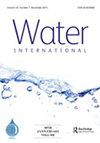论偶然性、信心和信任:国际水法如何在不确定条件下稳定预期
IF 1.5
4区 环境科学与生态学
Q3 ENGINEERING, CIVIL
引用次数: 0
摘要
国际水法如何能够在不确定的情况下稳定预期?我们运用现代系统理论,以澜沧江-湄公河为背景进行假设。我们提出:假设1:公平利用规范包含各种可能性以解决偶然性问题;假设2:无显著伤害规范选择值得保护的期望来解决信心问题;假设3:合作规范保留了解决信任问题的学习机会。我们的目的不是检验是否符合现实,而是促进对国际水法的理解。具体而言,我们评估了偶然性、信心和信任的系统问题如何影响法律的功能。本文章由计算机程序翻译,如有差异,请以英文原文为准。
On contingency, confidence and trust: how international water law stabilizes expectations under conditions of uncertainty
How is international water law able to stabilize expectations amid uncertain conditions? We use modern systems theory to hypothesize using the Lancang–Mekong River context. We propose: Hypothesis 1: Equitable utilization norms incorporate variant possibilities to solve the problem of contingency; Hypothesis 2: No significant harm norms select expectations worth protecting to solve the problem of confidence; Hypothesis 3: Cooperation norms retain learning opportunities to solve the problem of trust. Our aim is not to test correspondence with reality, but to stimulate understanding of international water law. Specifically, we evaluate how system problems of contingency, confidence and trust shape laws’ function.
求助全文
通过发布文献求助,成功后即可免费获取论文全文。
去求助
来源期刊

Water International
工程技术-工程:土木
CiteScore
4.40
自引率
7.70%
发文量
58
审稿时长
6-12 weeks
期刊介绍:
Water International is the official journal of the International Water Resources Association (IWRA), founded in 1972 to serve as an international gateway to the people, ideas and networks that are critical to the sustainable management of water resources around the world. Water International''s articles, state-of-the-art reviews, technical notes and other matter are policy-relevant and aimed at communicating in-depth knowledge to a multidisciplinary and international community. Water International publishes both individual contributions and thematic special issues and sections on cutting edge issues.
All individual manuscript submissions are subject to initial appraisal and peer review by the Deputy Editor in Chief and the Associate Editors, and, if found suitable for further consideration, to peer review by at least one independent, anonymous expert referee. All external peer review is double blind. Thematic issues and sections are handled under comparable procedures by guest editors under the oversight of the Editor in Chief.
 求助内容:
求助内容: 应助结果提醒方式:
应助结果提醒方式:


